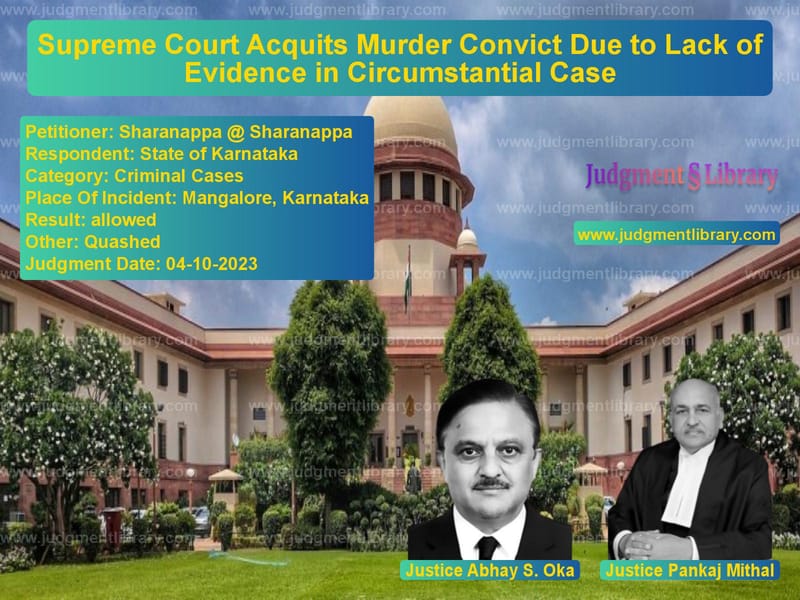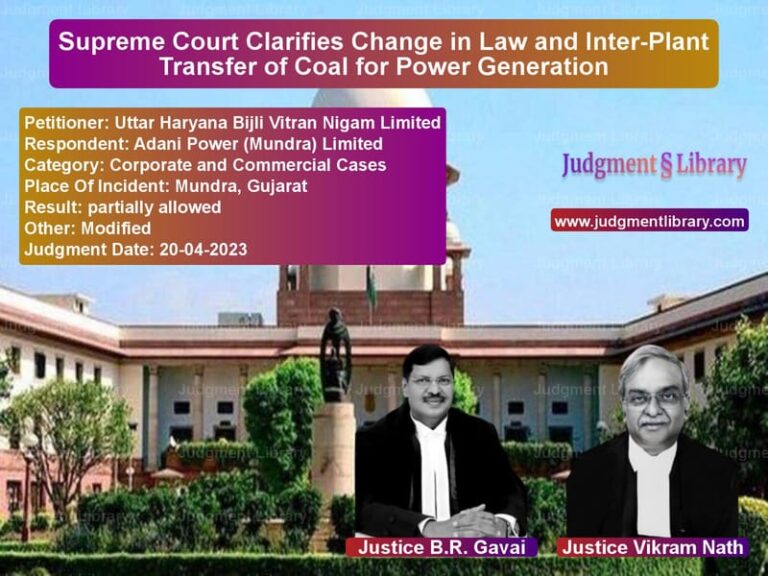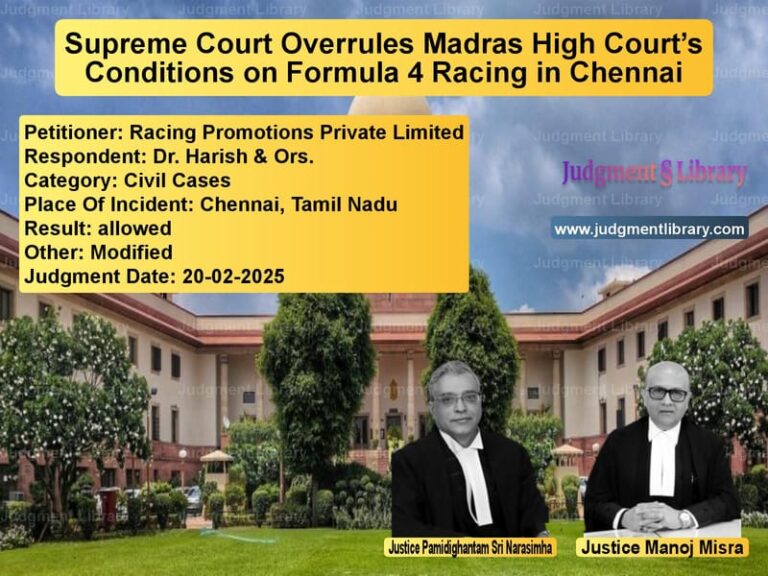Supreme Court Acquits Murder Convict Due to Lack of Evidence in Circumstantial Case
The Supreme Court of India has overturned the conviction of Sharanappa @ Sharanappa, who was previously sentenced to life imprisonment for the alleged murder of his wife, Meenakshi. The judgment highlights the importance of reliable circumstantial evidence and the necessity for prosecution to establish an unbroken chain of events linking the accused to the crime.
Background of the Case
The appellant, Sharanappa, was convicted by the Trial Court under Sections 302 (murder) and 201 (causing disappearance of evidence) of the Indian Penal Code (IPC). He was sentenced to life imprisonment and fined ₹25,000 for the murder of his wife. The Karnataka High Court upheld the conviction, leading to the appeal before the Supreme Court.
Key Legal Issues
- Whether the circumstantial evidence presented by the prosecution was sufficient to establish guilt beyond a reasonable doubt.
- Whether the ‘last seen together’ theory could be relied upon as the sole basis for conviction.
- Whether the alleged recovery of the weapon at the instance of the accused was legally valid.
Prosecution’s Case
The prosecution argued that:
- Sharanappa and Meenakshi were seen together near Mariyapura Bus Stop on May 28, 2004, as testified by PW-3, Alfred Mathai.
- On May 30, 2004, a woman’s decomposed body was recovered, later identified as Meenakshi.
- Sharanappa failed to file a missing complaint until May 31, 2004, despite knowing that his wife was missing since May 28.
- The accused led the police to the discovery of a knife, allegedly used in the crime.
Defense Arguments
The defense contended:
- The testimony of PW-3 was unreliable as he failed to identify the deceased at the time of the discovery of the body.
- The alleged last-seen evidence was fabricated, as there were no corroborating witnesses.
- The recovery of the knife was invalid, as the independent witnesses did not support the police version.
Supreme Court’s Observations
On Last Seen Together Evidence
The Supreme Court scrutinized the testimony of PW-3, Alfred Mathai, who claimed to have seen Sharanappa and Meenakshi together. The Court noted:
“PW-3’s testimony in the examination-in-chief contradicts his statements before the police. His version regarding seeing the accused and the deceased together is an improvement and cannot be relied upon.”
On Recovery of the Weapon
The Court dismissed the prosecution’s claim regarding the discovery of the weapon:
“Both PW-4 and PW-5, who were cited as witnesses to the recovery memorandum, have turned hostile. PW-4 stated that he signed the memorandum at the police station, and PW-5 did not confirm that the accused led them to the weapon.”
On Delay in Filing the Missing Complaint
The Court observed that mere delay in filing a missing complaint cannot be conclusive proof of guilt:
“It is not uncommon for family members to delay filing missing complaints, hoping the missing person will return. Such delay, without additional corroborative evidence, cannot be the basis for conviction.”
Final Judgment
The Supreme Court set aside the convictions, ruling:
- The prosecution failed to establish a complete chain of circumstantial evidence.
- The ‘last seen together’ theory was based on an unreliable witness.
- The recovery of the weapon could not be attributed to the accused.
The Court allowed the appeal, acquitting Sharanappa of all charges and canceling his bail bonds.
Impact of the Judgment
- Strengthening fair trial principles: The ruling reaffirms that circumstantial evidence must meet a stringent standard before convicting an individual.
- Role of witness credibility: The case highlights the importance of reliable witnesses in criminal trials.
- Proper police investigation: The judgment underscores the need for thorough and unbiased investigations to prevent wrongful convictions.
Conclusion
The Supreme Court’s decision ensures that mere suspicion and weak circumstantial evidence do not result in wrongful convictions. The judgment upholds the principle that the prosecution must establish guilt beyond a reasonable doubt, protecting the fundamental rights of the accused.
Petitioner Name: Sharanappa @ Sharanappa.Respondent Name: State of Karnataka.Judgment By: Justice Abhay S. Oka, Justice Pankaj Mithal.Place Of Incident: Mangalore, Karnataka.Judgment Date: 04-10-2023.
Don’t miss out on the full details! Download the complete judgment in PDF format below and gain valuable insights instantly!
Download Judgment: sharanappa-@-sharana-vs-state-of-karnataka-supreme-court-of-india-judgment-dated-04-10-2023.pdf
Directly Download Judgment: Directly download this Judgment
See all petitions in Murder Cases
See all petitions in Bail and Anticipatory Bail
See all petitions in Custodial Deaths and Police Misconduct
See all petitions in Legal Malpractice
See all petitions in Fraud and Forgery
See all petitions in Judgment by Abhay S. Oka
See all petitions in Judgment by Pankaj Mithal
See all petitions in allowed
See all petitions in Quashed
See all petitions in supreme court of India judgments October 2023
See all petitions in 2023 judgments
See all posts in Criminal Cases Category
See all allowed petitions in Criminal Cases Category
See all Dismissed petitions in Criminal Cases Category
See all partially allowed petitions in Criminal Cases Category







